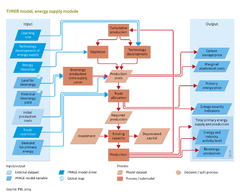Energy supply/Data uncertainties limitations: Difference between revisions
Jump to navigation
Jump to search
Oostenrijr (talk | contribs) m (Text replace - "CO2 " to "CO<sub>2</sub>") |
Oostenrijr (talk | contribs) m (Text replace - "CO<sub>2</sub>" to "CO<sub>2</sub> ") |
||
| Line 29: | Line 29: | ||
One of the main uncertainties with respect to long-term supply is the size of the resource estimates at various production costs. Estimates of energy resources vary significantly, especially non-conventional resource estimates for oil and natural gas. Equally important uncertainties are the nature and rate of technological advances, and the design and implementation of energy policies in different regions. | One of the main uncertainties with respect to long-term supply is the size of the resource estimates at various production costs. Estimates of energy resources vary significantly, especially non-conventional resource estimates for oil and natural gas. Equally important uncertainties are the nature and rate of technological advances, and the design and implementation of energy policies in different regions. | ||
Various PBL publications have analysed the sensitivity of the model to supply uncertainties. The Monte Carlo uncertainty analysis of various scenarios ([[Van Vuuren et al., 2008]]) identified model parameters as important determinants of the future supply such as oil and natural gas resources and renewable energy learning rates. Some of these factors were only important for a subset of scenario output. For instance, size of oil resources was found to directly influence future oil production, but had limited impact on future CO<sub>2</sub>emissions. The main reason is that oil production in the medium-term is constrained by competition from other fossil fuels and bioenergy. The results were also shown to be scenario dependent. Fossil fuel related uncertainties were more important in a scenario that resulted in a high rather than low fossil-fuel demand. | Various PBL publications have analysed the sensitivity of the model to supply uncertainties. The Monte Carlo uncertainty analysis of various scenarios ([[Van Vuuren et al., 2008]]) identified model parameters as important determinants of the future supply such as oil and natural gas resources and renewable energy learning rates. Some of these factors were only important for a subset of scenario output. For instance, size of oil resources was found to directly influence future oil production, but had limited impact on future CO<sub>2</sub> emissions. The main reason is that oil production in the medium-term is constrained by competition from other fossil fuels and bioenergy. The results were also shown to be scenario dependent. Fossil fuel related uncertainties were more important in a scenario that resulted in a high rather than low fossil-fuel demand. | ||
===Limitations=== | ===Limitations=== | ||
Revision as of 10:30, 1 July 2014
Parts of Energy supply/Data uncertainties limitations
| Component is implemented in: |
|
| Related IMAGE components |
| Projects/Applications |
| Key publications |
| References |
